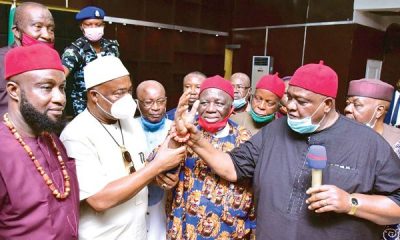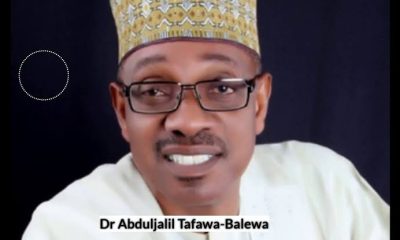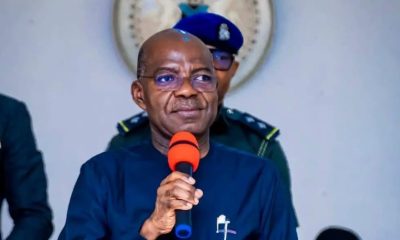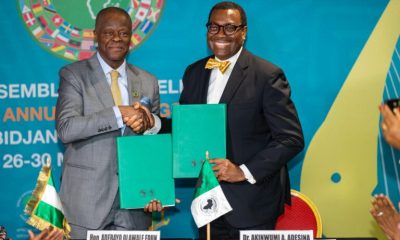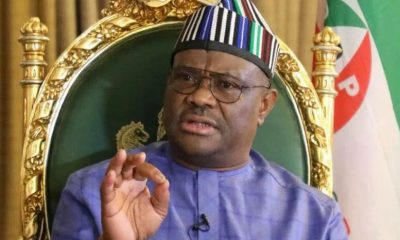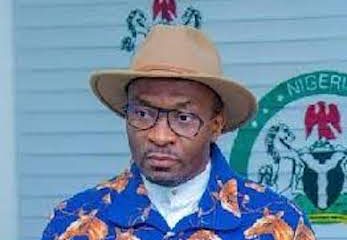OPINION
Striking the Soul of the Nation

By Dakuku Peterside
Omoni Oboli’s “Wives on Strike” is a blockbuster Nollywood movie where four semi-illiterate market women eagerly protest a child marriage anathema. Amina’s dad has compelled her to marry an older man against her will. Mama Amina opposes this marriage, but her hands are tied by culture, tradition, and religion.
She convinced her friends to get involved. They in turn approach their husbands to talk sense into Papa Amina, but when the men refuse to get involved, the women went on a sex strike. Other women across the country join in support until little Amina is freed. The narrative of this film symbolizes the new normal in Nigeria, where strike action is seen as the most effective way of getting the authorities to bend to the wishes of the workers.According to a report obtained from the Trade Union Services and Industrial Relations Department (TUSIR) of the Federal Ministry of Labour, about 103 labour complaints and trade disputes have been recorded so far in 2021. And out of these, 14 resulted in strike actions. The total number of disputes that would have led to strikes resolved was only seven. However, about 74% of these disputes are public sector-based, while about 26% is private sector-based.
These statistics contextualize the problem and evidences the prevalence of industrial conflicts in Nigeria. A cursory look at both the traditional media and social media recently will show an avalanche of news on strike actions. It is pertinent to state that some labour unions are synonymous with strike actions. Undergraduate students and their parents quickly link ASUU to perennial strike actions that have become almost a yearly ritual. Other labour unions are quickly catching up with ASUU in this inglorious position.
The Perceived unfair treatment that workers receive from their employers is one major cause of industrial disputes. Employees often demand better pay and condition of service for members.
Inflation is known to have dealt a heavy hand on workers compensation year in year out. Some members get mistreated by employers, and the union provides solidarity for them. These disputes are supposed to be resolved between disputing parties and must not necessarily result in strikes, and typically strike actions are supposed to be the last resort. When labour unions resort to strike as an instrument of resolving disputes, the entire system is disrupted, and lives, future opportunities and livelihoods are compromised. A lengthy strike negatively affects employment, reduces business confidence, and increases the risk of economic stagnation. In addition, such strikes have a significant setback on the growth of the economy and investment opportunities. The net loss to the economy in terms of man hours and overall economic loss dents the GDP and depresses the prospect of economic recovery.
Nigerians have suffered so much from strike actions, which have been a recurring phenomenon. Though strike action is recognized in the Nigerian legal system, its use should only be to achieve legitimate union objectives. However, the law stipulates conditions and procedures to adopt for strike actions to be legal. The union must follow the means for the peaceful settlement of the disputes as established by agreement or legislation, and these procedures must be thoroughly exhausted before any strike action is embarked on. The fact is that if the laws are strictly applied, most strike actions would be deemed illegal.
Why is there an aberration of strikes in Nigeria today? It almost seems that trade unions and their members savour the idea of strike and are willing to vote for it at the slightest provocation. If the mindset is to go on strike, trade union negotiators stubbornly refuse all reasonable negotiations and wait until strike actions before accepting those terms. With this situation in the country, most Nigerian trade unions get their members to embark on strike at the slightest provocation.
Their members are usually keen on voting down tools as they see it as an opportunity to rest at home or engage in other activities, knowing fully well that they would not lose any of their remunerations. Trade unions in Nigeria usually ensure that one of the conditions that the government must agree with before they can consider calling off a strike action is that none of their members would suffer any consequences from the strike action and that all their earnable salaries and allowances during the period they were not working are paid in full.
Elections into the leadership of most of our trade unions are now a do or die affair as these ‘comrades’, once elected to office, see an opportunity to make stupendous amounts of money. Aside from exploiting the opportunity to control check-off dues that most times runs into hundreds of millions of naira, many of them are alleged to have made money through ‘settlements’ from the employers to the detriment of their members or from government opponents intent on destabilizing the system to score political points.
It is common these days to see union leaders use expensive customized vehicles and hideously display opulence. Most of them turn to professional labour leaders without working in any organization.
The second reason for incessant strike action is the lack of integrity in the system. Most labour disputes have to do with the non- implementation of agreements. This situation speaks to the issue of the integrity of political leaders and private sector leaders. When contracts and agreements are entered into between negotiating parties in a labour dispute, they must be adhered to in their entirety. When government or management, whether incumbent or successive, refuses to comply with the agreement, it creates chaos and destroys trust in the ecosystem and leads to lengthy strike actions. The problem with this wicked action is that it makes the cheated party not trust the new agreements reached given that old ones are not adhered to. If an agreement is not complied with, it is not worth the paper it is written on, and no one should blame workers for further strike actions in this instance.
The third reason is that workers are frustrated by what they see as the impunity of corrupt leaders who lack political integrity and sacrifice for the public good. While living in stupendous opulence, political and corporate leaders demand that the workers be considerate, patriotic and consider the strike’s impact on people. These leaders are not altruistic and do not lead by example, especially when the service conditions they expect workers to endure are way too low from their immoral opulent standards. They hope workers on strike consider the public interest and get public sympathy and support while not willing to bring about a genuine resolution to the conflicts. A nation with an already dysfunctional public sector cannot afford to underfund public services. Funding and review of service conditions need to be continuous in line with inflation rates and cost of living indices.
The consequences of these strike actions in Nigeria are there for all to see. To illustrate, the incessant strike actions by the Academic Staff Union of Universities (ASUU), the organized labour union of lecturers in Nigeria, has left the educational system in tatters. Since 1999, ASUU has embarked on nationwide strikes more than 20 times, and four years of academic calendar cumulatively was lost.
And this does not include the avalanche of ‘local ASUU strikes’, whereby a particular vice-chancellor, University Governing Council or state government is at loggerheads with the academic staff of a specific university. The result is that the quality of education offered to Nigerian students has, at best, been mediocre.
The academic performance of students is adversely affected, and the entire educational system is almost crippled. These result in half-baked, unemployable students who lack the basic skills necessary to survive a dynamic environment.
In recent times, the National Association of Resident Doctors (NARD) seems to be competing with ASUU for the trade union most associated with industrial actions in Nigeria. NARD, with 16,000 doctors in their membership, represents about 40 per cent of doctors in Nigeria. They were still on strike at the time of writing ostensibly to push the government to honour its agreement on pay arrears, hazard allowance as well as insurance benefits to families of doctors who have died of the Covid-19 virus.
Interestingly, the current strike by the doctors is their fourth since the Covid-19 pandemic reached Nigerian shores last year.
And this recent strike comes as the country is battling with the third wave of the pandemic in the country propelled by the highly contagious Delta variant.
While health workers strike occurs globally, the impact appears more severe in Nigeria, challenged by poorer socio-economic circumstances, embedded infrastructural deficiencies, and lack of viable alternative means of obtaining healthcare. When Doctors go on strike, they are no longer apostles of life; they compromise on the Hippocratic oath of the medical profession and fiduciary obligation to patients. I understand the challenge of doctors, and other health workers struggle as ordinary employees who are rightfully entitled to a just wage for honest work versus their moral obligations to patients and society.
Recently, many Nigerian medical doctors in various fields such as anaesthesia, ICU, pediatrics and surgery, family medicine and others in their hundreds were undergoing interviews by a consultancy firm for the Saudi Arabia Ministry of Health, Meeds Consultancy, for work in Saudi Arabia. Most of the doctors interviewed complained of ridiculous wage, and poor conditions of service, with almost all of them referring to the current strike by the resident doctors. This mass exodus of medical professionals will definitely further compromise the quality of healthcare system in Nigeria where there are already human capacity gaps.
Most of the strike actions in Nigeria have resulted from the poor application of collective bargaining provisions. Under collective bargaining, leaders of a union articulate their grievances and negotiate with the employers for an amicable settlement. But what we have in most cases are either labour leaders with selfish interests to protect or corporate leaders or government officials with a myopic mindset that sees the workers in a particular sector as too greedy or dispensable.
For industrial actions to be reduced to a minimum, all the stakeholders and parties to collective bargaining should comply with the bargaining resolution. Government officials should be abreast of government revenue projections and should never enter into agreements that they know the government may not keep in the long run. There is no need to postpone the evil day.
Government is also a continuum, and an incumbent government should naturally see that it keeps to commitments made by the predecessors and should not also create problems for its successors.
Labour leaders should also be realistic about expectations from the government. Dwindling government revenues naturally means that the government should not continue to fund all economic sectors fully. Each industry and people working in it should find creative means of raising additional funds.
OPINION
Nigeria’s Security: Between Self-defence and Community Policing

By Mukhtar Ya’u Madobi
As Nigeria continues to battle worsening security challenges — ranging from banditry and kidnapping to terrorism, insurgency, and communal violence — citizens across the country are increasingly embracing grassroots security measures and calls for self-defence.
These challenges are not confined to the North. In the South, militancy, piracy, secessionist agitations, cultism, and cybercrimes further complicate the nation’s fragile security landscape. Speaking at the maiden annual lecture of the National Association of the Institute for Security Studies, themed “Mobilising Stakeholders to Curb Insecurity in Nigeria: A Practical Approach,” the Director-General of the State Security Service (SSS), Oluwatosin Ajayi, stressed the need for communities to take greater responsibility for their own security. He cited examples where local populations had historically repelled insurgents and urged communities to work closely with security agencies to counter threats such as terrorism, banditry, and kidnapping.Ajayi noted that it is unrealistic to expect security agencies to protect every citizen across Nigeria’s expansive territory. He argued that communities must serve as the first line of defence, and that empowering them would enhance grassroots resilience, while reducing over-reliance on federal forces.Echoing this position, former Chief of Defence Staff, General TY Danjuma (rtd), recently renewed his longstanding call for Nigerians to rise in self-defence against non-state actors. Reacting to fresh waves of violence in Plateau, Benue, and other states, Danjuma insisted that citizens can no longer afford to remain passive while bandits and terrorists wreak havoc.“The warning I gave years ago remains valid. Nigerians must rise and defend themselves. The government alone cannot protect us,” he said.This message of self-defence has increasingly resonated across vulnerable communities, reflecting the harsh reality of an overstretched security system that leaves millions exposed. The roots of the crisis lie in decades of state neglect, porous borders, weak intelligence systems, and economic exclusion.In the North-West, states such as Zamfara, Katsina, and Kaduna are under the siege of bandits, who raid villages, rustle livestock, extort ransoms, and impose levies. In the North-Central region, particularly Plateau and Benue states, farmer-herder conflicts have morphed into sustained ethno-religious violence. The South-East contends with secessionist violence linked to IPOB/ESN elements, who often target security infrastructure. Meanwhile, the South-West and South-South struggle with cultism, ritual killings, and piracy.One chilling episode was the abduction of more than 280 schoolchildren in Kuriga, Kaduna State, in March 2024. Although the children were eventually rescued, the incident laid bare the glaring weaknesses in Nigeria’s security infrastructure and left the community traumatised.Faced with these realities, several states have begun taking their destinies into their hands. In April, the Kano State Government passed the Security Neighbourhood Watch Law to create a legal framework for community-led security efforts. Katsina has trained local vigilantes through its Community Watch Corps, while in Zamfara, Governor Dauda Lawal launched the Community Protection Guards (CPG), a controversial but welcomed initiative in rural areas long neglected by formal forces.In the North-East, the Civilian Joint Task Force (CJTF) continues to support military efforts against Boko Haram, leveraging local knowledge and swift response capabilities. The Amotekun Corps in the South-West, headquartered in Ondo State, has addressed critical security gaps in the region, earning both criticism and praise. Similarly, the South-East’s Ebube Agu and joint regional outfits in the South-South emerged from the growing public distrust in the federal government’s ability to guarantee safety.However, the growing wave of self-defence and vigilante initiatives raises ethical, legal, and practical concerns. Nigeria’s Firearms Act prohibits civilians from bearing arms without a licence. Without a clear regulatory framework, arming civilians risks escalating violence, enabling political thuggery, and creating new security threats under the guise of protection.These dangers are not hypothetical. In Edo State’s Uromi community, vigilantes wrongfully accused 16 Northern hunters of being kidnappers and burnt them alive. In July 2022, Ebube Agu operatives reportedly killed 14 unarmed wedding guests in Otulu, Imo State. Other vigilante groups in the region have been implicated in extrajudicial killings and abuses. A Daily Trust investigation in April revealed that vigilante groups killed at least 68 people in three months, with many more subjected to torture, harassment, or unlawful detention.These developments have prompted the House of Representatives Committee on Army to call for the regulation, oversight, and training of vigilante groups. The Uromi killings, in particular, triggered national outrage and renewed demands for accountability.Responding to these concerns, Major General Chris Olukolade (rtd), chairman of the Centre for Crisis Communication, acknowledged General Danjuma’s fears but cautioned against unregulated civilian self-defence. He warned that unless communities are engaged within a structured and legal framework, insecurity may only worsen. According to him, civilians should not be armed unless integrated into formal security systems with clear guidelines.Against this backdrop, community policing has emerged as a more sustainable and coordinated alternative. Under the leadership of the Inspector General of Police, pilot schemes have been launched across several states. These involve recruiting and training locals for surveillance, intelligence gathering, and early intervention, followed by their integration into existing police structures.Lagos, Ekiti, and Kano States have all recorded notable progress. In Kano, the Hisbah Corps, initially tasked with moral enforcement, has been reoriented to contribute to broader urban security. In Lagos, the Neighbourhood Safety Corps plays a vital role in gathering intelligence and issuing early warnings.Nonetheless, community policing faces serious limitations. Funding shortfalls, inter-agency rivalries, and a lack of coordination continue to undermine its effectiveness. A major stumbling block is the constitutional contradiction where state governors are designated as chief security officers but lack control over federal police operations within their jurisdictions.Solving Nigeria’s security crisis requires a comprehensive strategy that addresses institutional, legal, and socio-economic issues. First, the constitution must be amended to empower state and community policing structures with defined jurisdictions and robust oversight. Second, vigilante and self-defence groups must be trained, regulated, and integrated into the formal security architecture to avoid becoming a threat themselves. Third, intelligence gathering should begin at the grassroots, where community members are often the first to notice early warning signs. Fourth, addressing the root causes of insecurity — such as unemployment, poverty, and youth disenfranchisement — through investments in education, job creation, and social empowerment is essential. Lastly, traditional and religious leaders must be given formal roles in mediation, peacebuilding, and community-based conflict resolution, given their influence and trust within local populations.Nigeria’s security challenges demand more than rhetoric and reactive responses. While the instinct to defend oneself is natural in the face of government failure, unregulated self-defence is a risky and unsustainable path. The lasting solution lies in creating a decentralised, community-driven security model rooted in legality, ethics, and shared responsibility.As communities across the country face mounting threats, the question is no longer whether to adopt localised security strategies — but how best to coordinate, empower, and regulate them before chaos becomes the norm.Mukhtar Ya’u Madobi is a research fellow at the Centre for Crisis Communication. He can be reached via ymukhtar944@gmail.com.
OPINION
This Trial of Oloyede
By Tunde Akanni
It’s been traumatic for my entire family since that video started making the rounds. I sneaked a slight view… It’s our trial. It’s my trial. Oloyede is genuine. He is most sincere. He is modestly so, as well. For us, however, Allah knows best.
I was with a trader in the afternoon of what I considered a dark Wednesday, the 14th of May. “Se bi won ni JAMB o get mo bayi…”. I had to cut in immediately. Which JAMB? “Madam, that’s one person I will vouch, and vouch for…zero tolerance for corruption. Absolutely responsible with a high level of consciousness for the good of others. If certain things went wrong at JAMB, I agree it’s his responsibility to carry all pleasant and other burdens but just know that the bad side of the operations may as well be sabotage. I have absolute trust in that man. Ask my own colleagues about me, but Oloyede is my own hero, somebody I have known for more than 40 years…”This is by no means a reductionist disposition to the tragedy induced by the so-called computer glitch. May the Almighty God in His infinite mercy console the parents of the candidate reported to have committed suicide. May God strengthen them to survive this gloomy phase of their lives and sustain them to reap bountiful compensation that will endure in their lives. It’s hard, so hard to pull tragedies of this magnitude. I personally feel for these parents.The said computer glitch, may we never fall victim to it. Those who work for big organisations requiring a large layout of ICT operations know what I’m talking about. Rather than being ‘solutional’, IT facilities can be unimaginably problematic sometimes, yet indispensable in this civilisational dispensation. This is not doubting deliberate sabotage, as may have happened in the case of JAMB. I’ve been part of Oloyede’s JAMB journey to attest to his commitment to offer his best for the otherwise sinking board.Far from being cosmetically exhibitionist, the Oloyede-led JAMB team, led by the Education minister, Tunji Alausa, went round the critical facilities of JAMB during the just concluded examination. Alausa saw, firsthand, like never before elsewhere in this country, how far JAMB had gone in its strive for transparency and the real-time monitoring of the conduct of examinations nationwide. Alausa, beyond being in awe, sought to make the JAMB effect spread immediately to other examination bodies.No be dem say, same day, the WAEC team came to JAMB and made it into the situation room, which was my own duty post. The NECO team followed suit afterwards, both duly led around by the sturdy lead IT consultant who’s been reliably there from Oloyede’s assumption of duty, Damilola Bamiro. Far richer, given that they charge more for their exams, the duo of WAEC and NECO were suddenly mandated to understudy the examination sector leader in Africa that JAMB has become over time.The staff of both WAEC and NECO suddenly had to undertake a professional excursion led through all the real time monitoring screens and other digital facilities. It was obvious they marvelled at what they saw, revealing a functional leader-subordinate synergy manifest with trendy output that the world can see and learn from.But that may even seem like the tip of the iceberg of the output of the hard work and commitment of the nation’s foremost icon of integrity in public service. A series of far more seemingly serious strides had been accomplished by Oloyede at JAMB. As a focused scholar, he keeps ensuring that every bit of the experience of the Board is treasured as worthy data to guide future actions and even subjects for further research.Not even the agencies dedicated to emergency matters in Nigeria could have been as prompt as the Oloyede management on this ugly glitch saga. Once the complainants began ventilating into the public space, JAMB rose to the challenge without any predictably traditional arrogant stance of government is always right. I was aware that a particularly strident public critic and a former students’ leader at Obafemi Awolowo University, Adeola Soetan commended the spokesperson for JAMB for the excellent handling of public complaints.Promptly, an independent team of investigators was set up to unravel the mystery leading to the rather depressing situation that now confronts us. The team, drawn from assorted but technically relevant constituencies, has found out that no fewer than 165 centres of over 800 examination centres nationwide were affected.Obviously well prepared for whatever the outcome may turn out to be, he braced up to the challenge to embrace the surrender value to tell it to the world as it is. This trial is for all of us who believe and trust Oloyede. I am in this group. So much so that his public cry infected me…It was a patriot’s cry for his beloved country. Like me, a former Law don at LASU, Dr Kilani wasn’t any less affected as demonstrated in a quick note to me: “I write to associate myself with the pain, sorrow and emotion of our own Professor Oloyede. I could not hold my tears seeing him cry. May Almighty Allah see him through. May we all not be put to shame…”But then came a soothing message from Gbade Osunsoko, my cousin: “…He will come out of this much stronger because Nigerians will trust him far better than a number of our leaders.. A man that makes mistakes happens under him and takes responsibility – it’s a big deal in Nigeria.”With Oloyede, young Nigerians with challenges regarding sight are no longer left to moan their fate endlessly, with adequate provision for their inclusion in the UTME. How many of our public facilities are this inclusion conscious as stipulated by SDGs? How come a legacy built through almost a decade at the very best cost ever possible will be made to crumble when the game changer leader remains ever modest? JAMB has steadily risen through thick and thin to accomplish its tasks to the admiration of stakeholders, nationally and internationally, under Oloyede. Both NNPC and the Nigeria Police, being beneficiaries, can attest to the current competence of JAMB. How many other numerous stakeholders nationwide never deemed to have any relevance to JAMB before Oloyede but have since become critical, if not indispensable players?But why does this sudden saddening encounter threaten our joy of service without blemish? Why this unforeseen truncation of a good story, so intentional, coming from Africa? Whodunnit? Surely the truth shall come out for the world to perceive and assess and get to appreciate the efforts and the quantum of commitment appropriated to the JAMB excellence project driven by Oloyede.One cannot but be deeply concerned. Before the very eyes of a few of us carefully selected to give support from our respective professional perspectives from the very beginning, Professor Oloyede’s concern for genuine growth and development was real. It is still real and increasingly so, as a matter of fact. Indeed, inimitable. It shall be well.Tunde Akanni is a professor of Journalism and Development Communications at the Lagos State University, LASU. Follow him on X:@AkintundeAkanniOPINION
Democracy, Institutions, and the Rule of Law

By Kator Ifyalem
Democracy, often hailed as the cornerstone of modern governance, is a system that empowers citizens to participate in the decision-making processes that shape their lives. However, the mere existence of elections is not enough to ensure a fair, just, and prosperous society.
Without robust institutions, the rule of law, and ingrained values, democracy can become a hollow shell, susceptible to corruption, manipulation, and eventual collapse. At its core, democracy is built on the principle that power resides with the people. This power is exercised through fair elections, where citizens choose representatives to govern on their behalf. The effectiveness of this system relies heavily on the strength of supporting institutions, adherence to the rule of law, and shared values that guide societal behaviour.Institutions serve as the backbone of a democratic society, translating the will of the people into action. These include governmental bodies such as the legislature, executive, and judiciary, as well as independent organizations like electoral commissions, anti-corruption agencies, and human rights commissions. These institutions provide checks and balances, ensuring that no single entity or individual can accumulate too much power. They create a framework for accountability, transparency, and effective governance.An independent judiciary is crucial for upholding the constitution and protecting individual rights. Without it, laws can be manipulated or ignored by those in power, leading to tyranny. Similarly, a free and independent media acts as a watchdog, informing citizens and holding those in power accountable. When media institutions are weakened or controlled by vested interests, the flow of information is compromised, and citizens are unable to make informed decisions.The rule of law is another critical component of a functioning democracy. It ensures that all citizens, regardless of their status or position, are subject to the same laws and legal processes. This principle is fundamental to creating a fair and just society where everyone’s rights are protected. A robust legal framework, consistently and fairly enforced, provides the predictability and security necessary for social and economic development. It protects property rights, enforces contracts, and creates an environment conducive to investment and growth.Moreover, the rule of law is essential for protecting minority rights and preventing the tyranny of the majority. In a true democracy, the rights of all citizens must be respected, even if they are not part of the ruling majority. This protection is enshrined in laws and enforced through effective legal institutions.Values form the third pillar of an effective democracy. These shared beliefs and principles guide societal behaviour and inform policy-making. Democratic values include respect for human rights, tolerance of diversity, commitment to justice, and belief in the equality of all citizens. When these values are deeply ingrained, they act as a safeguard against authoritarian tendencies and help preserve the integrity of democratic institutions.For instance, a healthy democracy can be likened to a three-legged stool, where institutions, the rule of law, and democratic values form the legs. Just as a stool cannot stand stably without all three legs being strong and balanced, a democracy cannot function effectively if any of these elements is weak or missing. In Nigeria’s case, we’ve seen how weaknesses in one area, such as institutional challenges in election management, can put stress on the other legs, requiring the judiciary (rule of law) and civil society (democratic values) to bear more weight to maintain stability.Education plays a crucial role in instilling these values. A well-informed citizenry, aware of their rights and responsibilities, is better equipped to participate meaningfully in the democratic process. Civic education programs that teach the principles of democracy, the importance of institutions, and the value of the rule of law are essential for creating engaged and responsible citizens.The interplay between institutions, the rule of law, and values creates a self-reinforcing cycle that strengthens democracy. However, this cycle can also work in reverse. Weak institutions often lead to a breakdown in the rule of law, eroding democratic values and further weakening the system. This negative spiral will ultimately lead to the collapse of governance, even if the outward trappings of democracy remain.To prevent this decline, concerted effort is required on multiple fronts. Institutional capacity must be built and maintained through adequate funding, training, and support. The rule of law must be consistently enforced, with mechanisms in place to address corruption and abuse of power. This requires not only strong legal frameworks but also a commitment to their implementation.International cooperation also plays a role in strengthening democracy. Countries learn from each other’s experiences, share best practices, and provide support for development. However, it’s crucial to recognize that democracy cannot be imposed from outside; it must be nurtured from within.True democracy requires more than just the act of voting; it demands a comprehensive system of governance that respects the rights of all citizens, upholds justice, and promotes the common good. Strengthening these fundamental pillars (institutions, the rule of law, and values), is crucial in building more resilient, effective, and truly representative democracies that serve the needs of all citizens and contribute to global stability and prosperity. Where does Nigeria as a nation stand on this scale?






